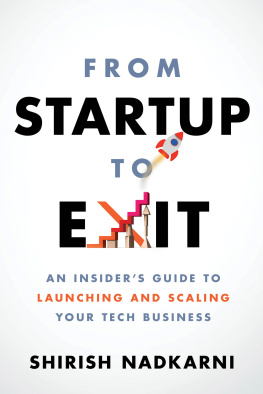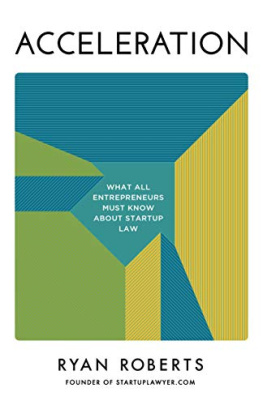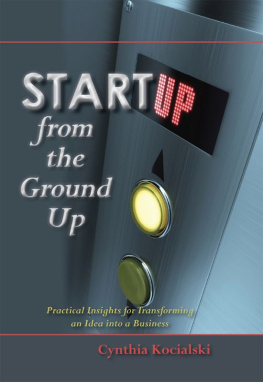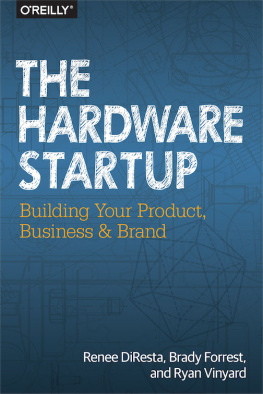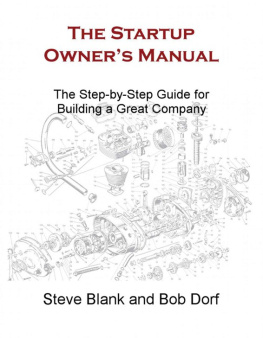Vitaly M. Golomb is a venture capitalist, serial entrepreneur, keynote speaker and author who has been involved with startups since his teenage years. He is a Global Corporate Venturing 2017 Rising Star and leads global investments at HP Tech Ventures, the corporate venture arm of Silicon Valleys original startup. He is a contributing writer to TechCrunch and a consistently top-ranked mentor at a number of startup accelerator programs in the US, Europe, and Asia. He lives in the San Francisco Bay Area and travels to over 20 countries annually to consult and guest lecture to corporations, associations and universities on entrepreneurship, innovation and design.
Vitaly M. Golomb is available for select speaking engagements.
Foreword
Startups are a pain in the ass. In fact a proper Englishman might even exclaim, STARTUPS are an ASS!
Indeed, most startups are rather foolish. Most of them die within a year or two. The ones that survive often dont produce anything magical and they often don't get very big. Even the ones that DO create amazing new stuff and become big successful companies result in a lot of pain and suffering on the road to success. Building a startup can be a non-stop rollercoaster of challenges and changes, likely to drive you crazy long before your startup donkey turns into a big beautiful Unicorn, and before you become a successful entrepreneur.
In short: most startups are Donkeys, not Unicorns - Silicon Valley slang for a startup company worth over $1 billion. Theyre exceedingly rare.
But here's the thing about entrepreneurs -- especially Silicon Valley tech entrepreneurs -- EVERY ONE of us thinks we are going to be a Unicorn, not a Donkey. We convince ourselves were going to build the Next INSANELY GREAT startup, get rich and (Internet) famous, and we think adoring crowds will flock to us and follow us on social media. Awesome, let's get started! Except, it turns out most of us aren't going to be the next Bill Gates or Steve Jobs or Mark Zuckerberg. Most of us are more likely to be Homer Simpson, and wed rather eat a donut and fall asleep watching TV instead of working hard to MAKE and SELL the donuts or TVs.
Rarely do most of us run the marathon long enough and well enough to make it across the finish line and certainly not without a few breakdowns along the way. Despite the potential for fame and glory, doing a startup isn't usually pretty - it can be tough to build the right product, find the right customers, raise or borrow capital, hire and grow a team, and make payroll. Startups are often a lot of work.
And yet, even with all the inherent challenges and failures, entrepreneurship can be a HUGE positive and global force for good - good for innovation, for making customers happy, for economic benefits, for creating jobs, for building bridges between countries and cultures, via commerce and community.
Even when startups fail to become Unicorns, they can still create inspiration and expose lessons for entrepreneurs. The pursuit of entrepreneurship is what drives us to create new products, to practice our craft and develop our skills, to work hard, to strive towards the sun in pursuit of an impossible dream the Autonomous Hot Dog Delivery Drone! Well, maybe some startups are less inspiring than others ;)
Every once in awhile however, we get lucky and get it right.
Although the percentage of startups that scale and grow to thousands of employees and billions of dollars is small, the impact and returns of a single Unicorn can have outsize effects on driving innovation and market change. Silicon Valley happens to be very good at Unicorn Farming, and we have a LOT of Unicorns and a lot of Unicorn Wannabes too!
A few major changes over the past few decades have provided even more rocket fuel to accelerate the Silicon Valley startup revolution.
More than a decade ago, companies like Amazon and Google started providing hosted computing services in the cloud that enabled startups to outsource a big chunk of their IT needs and costs. Free, open source software platforms for managing servers and databases also enabled cost savings. Previously, startups had to raise millions of dollars just to pay for their hardware, software, and IT services. Nowadays, many startups get up and running MUCH faster and cheaper by relying on other startups for critical functions like data storage, compute power, email delivery, voice, text, payment, and shipping & logistics.
Another big change over the past 20 years has been the massive consumer adoption of technology and the Internet by most people on the planet and the activation of more than 3 billion smartphones. Now we can start a company in weeks or months and use the Internet to quickly establish a connection and business relationship with almost anyone in the world.
The combination of reduced costs in building startups along with the speed increase / force multiplier of outsourcing tech services to the cloud, and access to millions (now billions) of customers online - all of these factors have created an EXPLOSION of startups and an astonishing acceleration in the pace of building and scaling businesses. Lastly, the growth of VC funds, corporate investment, and the angel investor market has helped expand capital availability for startups.
However, access to capital is not universal and even in Silicon Valley raising capital can be tough. But with new fundraising platforms and services like AngelList, FundersClub, KickStarter, and more, I believe we will see even more startup capital in the US and around the world.
Governments, corporations, and academia all have their role to play in supporting, investing, and guiding the efforts of entrepreneurs and startups to drive innovation. Healthy startup ecosystems require more than just capital and entrepreneurs. The more substantial the number of participants and cash in the system the more likely the ecosystem is to succeed.


